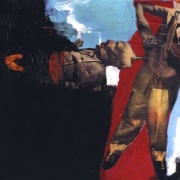The Fear of Heights:
Movie Theatre Haiku
- Indie/Alternative
- 2009
- Buy the CD
Reviewed by Michael Fortes
()
What hits hardest right off the bat is Robley’s voice – full-throated and in total command, he has all but forsaken the whispered hush of Drunken Dance, the better to drill in the protagonist’s despair over the non-appearance of her sailor lover in "A Memory Lost at Sea," or the harsh reality of a relationship’s end in the very Beatlesque (circa 1966) "User Friendly Guide to Change."
His ear is still firmly planted in the present, though – "Solipsist in Love" evokes vintage new-millennium Radiohead, and pretty much throughout the whole album he shows he’s not afraid to mix in electronic textures with his usual blend of natural acoustic guitars, drums and horns. Better still is the Pierre Henry-esque avant garde interlude of noise known as "Glass Reich," in which Robley pushes his tendency toward creating instrumental "palate cleansers" to its logical extreme.
As for the characters, they are still typically dysfunctional, or as Robley would have it, "measure[ing] distances in a shrinking world." The banner case study, "My Life in Film Festivals," which previously bore the title now given to the album, is the now semi-famous (among Robley’s following, at least) chronicle-in-song of the end of a deteriorating relationship in which the protagonists are fighting out of boredom, and fighting what Kurt Cobain might have called "the comfort of being sad." The song allegedly drove a real life couple in a similar situation to finally call it quits, which pretty much ensures that "Film Festivals" will end up on at least two people’s "songs that changed my life" lists. Meanwhile, the aforementioned "Solipsist" could easily have been borrowed from one of Elvis Costello’s many suspicious-lover sob stories, albeit pruned to a more efficient, easily digestible number of words.
Which brings us to Haiku’s greatest strength – as balancing acts go, Robley’s wordier character sketch moments in focused story-songs like "Atheist’s Prayer" – sung in the first person from what sounds more like a confused agnostic over a gentle piano-based track – are checked even more closely by catchy choruses with punchy percussion in tunes like "Concrete and Nails" and "Baltimore Fugitives Buried in Brownsville, TX."
The album slithers away rather quietly and modestly with the mostly-spoken "Permanent Fixture of Regret" and a cute counting afterthought (the one-minute "Waltz for Angelika Dittrich"), with a soft-landing that almost mirrors the quiet exit style of Pearl Jam’s No Code. Most importantly, though, Movie Theatre Haiku is Robley’s firmest landing yet, feeling less like the sum of his influences, and most like his own confident voice.
You can follow us on Twitter and Facebook for content updates. Also, sign up for our email list for weekly updates and check us out on Google+ as well.













